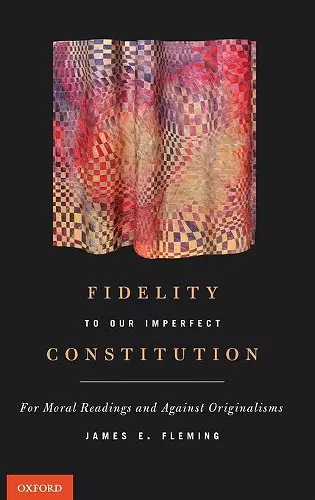Fidelity to Our Imperfect Constitution
For Moral Readings and Against Originalisms
Format:Hardback
Publisher:Oxford University Press Inc
Published:27th Aug '15
Should be back in stock very soon

In recent years, some have asked "Are we all originalists now?" and many have assumed that originalists have a monopoly on concern for fidelity in constitutional interpretation. In Fidelity to Our Imperfect Constitution, James Fleming rejects originalisms-whether old or new, concrete or abstract, living or dead. Instead, he defends what Ronald Dworkin called a "moral reading" of the United States Constitution, or a "philosophic approach" to constitutional interpretation. He refers to conceptions of the Constitution as embodying abstract moral and political principles-not codifying concrete historical rules or practices-and of interpretation of those principles as requiring normative judgments about how they are best understood-not merely historical research to discover relatively specific original meanings. Through examining the spectacular concessions that originalists have made to their critics, he shows the extent to which even they acknowledge the need to make normative judgments in constitutional interpretation. Fleming argues that fidelity in interpreting the Constitution as written requires a moral reading or philosophic approach. Fidelity commits us to honoring our aspirational principles, not following the relatively specific original meanings (or original expected applications) of the founders. Originalists would enshrine an imperfect Constitution that does not deserve our fidelity. Only a moral reading or philosophic approach, which aspires to interpret our imperfect Constitution so as to make it the best it can be, gives us hope of interpreting it in a manner that may deserve our fidelity.
Building on the work of Ronald Dworkin and other scholars, Fleming (Boston Univ. School of Law) challenges the intellectual honesty and practical vitality of originalism. More importantly, though, Fleming develops a positive case for living constitutionalism as a theory that reflects the Constitutions aspirational spirit. * S. B. Lichtman, Shippensburg University, Choice: US Politics *
James Fleming exhorts us to recognize both the good and the bad in our nation's history, to honor the Constitution's aspirational commitments, and to realize our country's potential for a more perfect union. This remarkable book is a powerful statement of Fleming's moral reading of the Constitution and an excellent guide to contemporary constitutional theory." Jack M. Balkin Knight Professor of Constitutional Law and the First Amendment Yale University Law School
Fidelity to Our Imperfect Constitution surveys the landscape of contemporary American constitutional theory with critical imagination and insight. In addition to mounting forceful attacks on the 'originalist' and 'living constitutionalist' approaches that have recently dominated the field, James Fleming emerges in this book as the ablest current defender of a 'moral reading' approach (long championed by Ronald Dworkin) that calls upon judges to make candid moral judgments in interpreting the Constitution that we have, not fashioning a new one." Richard Fallon Ralph S. Tyler, Jr. Professor of Constitutional Law Harvard University Law School
In Fidelity to Our Imperfect Constitution, James Fleming argues persuasively against all forms of originalism: 'old time originalism,' which ties constitutional meaning to the specific and concrete applications envisioned by framers or ratifiers, 'new originalism,' which allows for the Courts to 'construct' a constitutional law as well as determine constitutional meaning, and 'living originalism' which looks for originalist meanings that are sufficiently abstract so as to accommodate contemporary decisions that are at odds with, or simply beyond the purview of the Constitution's framers. He presents in their stead a vigorous defense of a moral and philosophical approach to Constitutional meaning. The book is a welcome elucidation of neo-Dworkinian constitutional analysis, from a generous and thoughtful critic of our seeming rush to the false comfort of the authority of the Constitution's framers." Robin West Frederick Haas Professor of Law Georgetown University Law Center
ISBN: 9780199793372
Dimensions: 236mm x 152mm x 23mm
Weight: 522g
264 pages